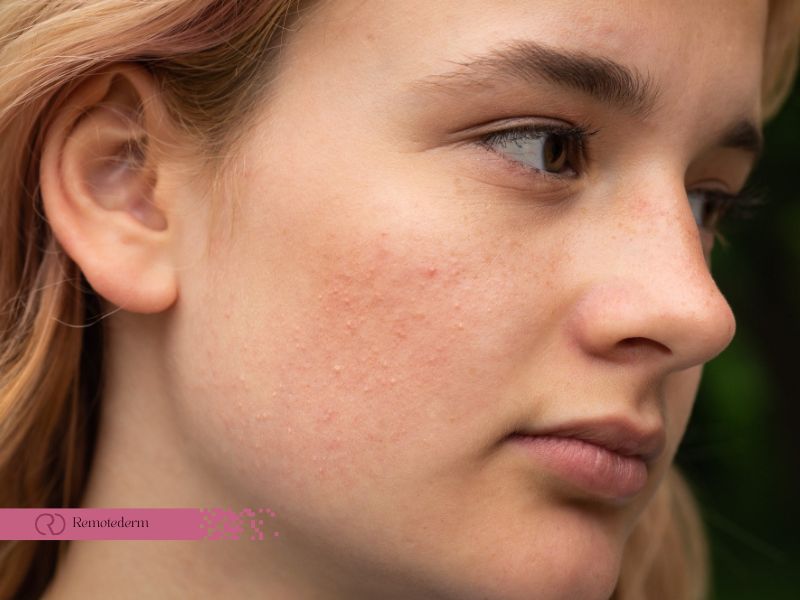Dealing with dry skin and acne at the same time can feel like a nightmare. While many people assume acne only happens with oily skin, dry skin can also lead to breakouts. If you’re in Canada, where the weather doesn’t do your skin any favors, it’s even more of a challenge. This guide dives into what causes dry skin acne, the best ways to manage it, and how to build a routine that keeps your skin happy and breakout-free.
Does Dry Skin Cause Acne?
Yes, dry skin can cause acne. When your skin gets too dry, it compensates by overproducing oil, which can clog pores and lead to breakouts. On top of that, dry skin can crack, making it easier for bacteria to sneak in and cause inflammation.
Common Triggers for Dry Skin Acne
Dealing with dry skin and breakouts? Here are a few common culprits behind this annoying combo:
- Cold weather: Winters in Canada strip your skin of moisture, leaving it vulnerable.
- Harsh skincare products: Overusing exfoliants or strong cleansers can dry out your skin and make acne worse.
- Skipping moisturizer: Not hydrating your skin enough leads to more dryness and, ironically, more acne.
How to Remove Acne from Dry Skin
Dealing with acne when you have dry, sensitive skin requires a careful approach. Here’s how you can tackle it:
Step 1: Use a Gentle Cleanser
- Opt for a mild, hydrating cleanser that won’t strip your skin.
- Look for ingredients like ceramides and glycerin to lock in moisture.
Step 2: Moisturize Religiously
- Pick a rich, non-comedogenic moisturizer to keep your skin hydrated.
- Hyaluronic acid and squalane are excellent for adding hydration without clogging pores.
Step 3: Spot Treat Smartly
- For acne spots, use benzoyl peroxide or salicylic acid sparingly.
- Avoid applying treatments all over your face; focus only on the pimples.
Step 4: Add a Humidifier
- Especially in dry climates like Canada, a humidifier can keep the air—and your skin—hydrated.

Best Acne Treatments for Dry Skin
Finding the best acne treatments for dry skin means looking for options that treat breakouts without aggravating dryness.
Over-the-Counter Treatments
- Niacinamide: Soothes inflammation and improves your skin barrier.
- Azelaic Acid: Fights acne and reduces redness, perfect for sensitive skin.
Prescription Options
If OTC products don’t cut it, consider seeing a dermatologist. Acne online dermatology services in Canada can prescribe:
- Retinoids: These are great for acne, but use them with a good moisturizer to avoid dryness.
- Antibiotic creams: Help with inflamed, stubborn acne.
Avoid These Mistakes
- Don’t use alcohol-based toners—they’ll dry out your skin even more.
- Skip clay masks unless your skin is balanced with moisture beforehand.
Building a Skin Care Routine for Dry Skin Acne
Consistency is key to managing acne with dry skin. Here’s a skin care routine you can try:
Morning Routine:
- Cleanse: Use a gentle, hydrating cleanser.
- Moisturize: Apply a lightweight moisturizer with SPF to protect your skin.
- Sunscreen: Go for a non-comedogenic sunscreen, even in Canada’s winter months.
Night Routine:
- Cleanse: Wash off the day with a mild cleanser.
- Treat: Apply a spot treatment or any prescribed acne treatment.
- Moisturize: Use a thicker moisturizer to lock in hydration overnight.

How Weather in Canada Affects Dry Skin Acne
The climate in Canada has a significant impact on acne and dry skin.
- Winter: The freezing air outside and heating indoors can suck the moisture out of your skin, making breakouts more likely.
- Summer: The combination of dry air in certain areas and sun exposure can irritate sensitive skin, causing flare-ups.
Drinking plenty of water is essential for maintaining healthy skin throughout the year.
Final Thoughts
Dry skin acne can be frustrating, but the right skin care routine and products make a world of difference. Focus on keeping your skin hydrated while treating acne with gentle, non-irritating products. For persistent issues, consulting a dermatologist, whether in person or through acne online dermatology services in Canada, is always a smart move.
Remember, managing dry skin acne takes time, but with consistent care, your skin can find its balance.
FAQs
1. Can makeup cause acne on dry skin?
Yes, even on dry skin, acne can result from wearing makeup that clogs pores or from improperly removing it. Always wash well and use non-comedogenic products.
2. Can drinking water help with dry skin acne?
Although it won’t treat acne directly, staying hydrated can help your skin look better overall. For optimal effects, combine hydration with a good skincare regimen.
3. Are facial oils good for dry skin acne?
Some facial oils, like rosehip or squalane, can hydrate dry skin without clogging pores. However, avoid heavier oils like coconut oil, which can trigger breakouts.
4. How can I prevent dry skin acne during Canada’s winter?
Use a humidifier indoors, switch to a richer moisturizer, and avoid hot showers that can strip your skin of natural oils.
